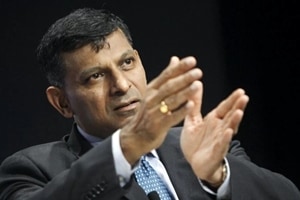Speculation is rife about whether Reserve Bank of India (RBI) governor Raghuram Rajan will be given a second term by Prime Minister Narendra Modi-led NDA government. Rajan is an internationally renowned central banker, with many global analysts and economists all praises for his handling of monetary policy and the stability that he has brought to the Indian rupee.
Rajan took over as the RBI governor at a time when India’s inflation was above 10% and the Indian rupee was staring at a crisis. Not only did he hike rates to tame inflationary expectations, Rajan also took a number of steps to step the rapid depreciation of rupee – opening a swap window for deposits from NRIs, being one of them.
Come 2016, rupee is stable and inflation has reduced to sub-6% levels. The economy is on a mend and Rajan has in the last few monetary policy reviews reduced key rates, and given a thumbs up to Modi government’s moves to address supply side issues and stick to fiscal deficit targets. (Also read: Raghuram Rajan’s speech at LSE: Questions feasibility of ‘helicopter money’ policy)
However, one emerging problem for the Indian economy is the banking sector stress, which is threatening to spill over and impact other sectors. The RBI asked all banks to start recognising all stressed assets from October-December quarter. The move led to a spurt in gross NPAs in the public sector banks, which control 70% of banking assets in the country, by about Rs 1 lakh crore to about Rs 4 lakh crore at end-December 2015, from Rs 3 lakh crore in September-end.
Commenting on the ‘perceived delay’ in taking action against rising bad loans, Rajan recently said the central bank accorded priority to protecting jobs by trying to put stressed assets back into health, while investigative agencies deal with cases of malfeasance. “I think we have it (NPAs) contained,” Rajan said. (Also read: Raghuram Rajan on student loans, education & free markets: 7 gems from RBI governor’s speech)
While September is still some months away, murmurs in the market corridors have begun – will Rajan bag another term at RBI? How has his first term as RBI governor been? Has he done enough to stabilise the economy and help the banking sector?
Says Arun Singh, Senior Economist at Dun & Bradstreet India, “Raghuram Rajan’s term as RBI governor has certainly benefited the Indian economy. Inflation has come down and the banking sector has also seen some good steps being taken in the right direction.”
“While I am in no position to comment on whether Rajan will get a second term, chances are that he may, I believe that if he does, he should focus more on dealing effectively with banking NPAs. India’s banks are bleeding and require immediate attention,” Singh says. “Also, in his second term as governor, we would like to see greater understanding between the RBI and the Ministry of Finance,” he adds.
Radhika Rao, Economist at DBS Bank credits Rajan for addressing a key problem, inflation, which was plaguing Indian economy at the time he took over in 2013. “Rajan is regarded as a credible policymaker, not only within India but also in international circles. His focus has been on addressing two key pain points of the economy i.e. inflation and currency volatility, and notable progress has been made on both these counts since he assumed office years back,” Rao tells FE Online.
Rao adds, “Without diluting its independence, the central bank has also adopted a cohesive policy approach with the government, which has helped maintain overall macro-stability. His other achievements include a forward-looking approach towards financial sector reforms, systematic and thorough approach in dealing with banks’ stressed assets and revamp of the monetary policy framework.”
So, should Rajan be given a second term? “In the past, the decision on governor’s appointments has been taken closer to the end of the term and to that extent the speculation of his re-appointment is still relatively premature,” she says.
Recently, CLSA’s Christopher Wood warned that if Rajan is not given a second term, Indian rupee would be affected negatively. In a report, Wood has said that the biggest risk to India’s bond and currency market will be if Rajan is not given a second term. Wood feels that some of the financial markets could be impacted if the government does not renew Rajan’s term.
According to a media report, Wood said, “He (Prime Minister Narendra Modi) must recognise the constructive role played by RBI under Rajan in both imposing a tighter NPL (non-performing loan) system on banks, carrying out a stress test on banks and putting pressure on them to go after defaulting creditors.”
